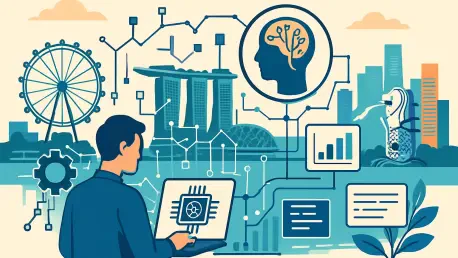In a rapidly evolving digital landscape, Singapore stands on the brink of a transformative economic opportunity, where artificial intelligence (AI) could drive software innovation to generate over S$6 billion annually, marking a significant milestone for the nation. This staggering potential emerges from a comprehensive survey of 252 C-level executives, highlighting how AI is reshaping the software development sector and positioning it as a cornerstone of national growth. The findings underscore a pivotal moment for businesses in Singapore, where embracing AI not only promises significant revenue boosts but also demands a delicate balance of technology and human expertise. As companies navigate this new terrain, the focus sharpens on overcoming challenges like skills shortages and ethical concerns while maximizing productivity gains. This convergence of innovation and strategy signals a future where Singapore could solidify its status as a global tech hub, provided the right steps are taken to harness AI’s full potential.
Economic Impact of AI-Driven Software
The economic implications of AI in software development are profound, with projections estimating an annual contribution of S$6.24 billion to Singapore’s economy. A key driver behind this figure is the remarkable efficiency AI brings to developers, saving an estimated S$31,213 per developer each year. This translates into substantial cost reductions and productivity gains for organizations across the board. Moreover, 64% of surveyed executives reported revenue growth directly tied to software innovation initiatives over the past year, with AI adoption expected to further amplify this by 39% in the coming years. Such numbers paint a vivid picture of AI not merely as a technological tool but as a vital economic engine, capable of propelling Singapore’s digital economy to new heights. The consensus among business leaders is clear: prioritizing AI-enhanced software is no longer optional but a critical component of sustaining competitive advantage in a fast-paced global market.
Beyond the raw numbers, the ripple effects of AI-driven innovation promise to reshape Singapore’s corporate landscape in meaningful ways. Executives anticipate a 44% surge in developer productivity, enabling faster delivery of solutions and more agile responses to market demands. This efficiency is particularly crucial in an era where speed often determines success. Companies are already witnessing tangible benefits, as software innovation becomes a core business priority rather than a peripheral activity. The potential for such growth underscores the urgency for organizations to invest strategically in AI technologies, ensuring they are not left behind in an increasingly digital world. However, realizing this S$6 billion opportunity hinges on addressing systemic challenges, from talent development to robust governance, to ensure that economic gains are both sustainable and equitably distributed across industries.
Human-AI Collaboration in Development
The interplay between human expertise and AI capabilities is redefining software development in Singapore, with current workloads split at approximately 75% human and 25% AI. Executives envision a future where this balance shifts to a near-equal 50/50 partnership, reflecting optimism about AI’s growing role while acknowledging the irreplaceable value of human insight. This shift is fueled by the emergence of agentic AI—systems designed to operate autonomously in development tasks—with 90% of leaders expecting it to become an industry standard within the next three years. Yet, this transition is not without hurdles, as concerns over cybersecurity, cited by 53% of respondents, and data privacy, noted by 49%, loom large. These challenges highlight the need for a cautious approach to integration, ensuring that technological advancements do not compromise security or trust in digital ecosystems.
Addressing these concerns, half of the surveyed executives are actively implementing governance frameworks aligned with regulatory standards to manage AI deployment responsibly. Alongside internal policies and ethics committees, there is a strong push to mitigate risks while fostering innovation. Additionally, the importance of human skills remains paramount, with all leaders agreeing that strategic vision and creativity are essential contributions that machines cannot replicate. A striking 93% advocate for training programs to equip employees with the ability to collaborate effectively with agentic AI, signaling a proactive effort to bridge talent gaps. This dual focus on governance and upskilling reflects a broader understanding that the future of software development in Singapore depends on a harmonious blend of human ingenuity and AI efficiency, creating a synergy that maximizes outcomes without sacrificing ethical standards.
Strategic Alignment in Corporate Priorities
In Singapore’s corporate boardrooms, AI and software innovation have risen to the forefront of strategic discussions, with 95% of executives noting that their boards recognize the transformative benefits of these technologies. This acknowledgment is backed by substantial financial commitment, as 83% of leaders are prepared to allocate over half of their annual IT budgets to such initiatives. This shift indicates a maturing perspective on technology’s role in driving business value, moving beyond mere operational support to a central pillar of growth. Furthermore, nearly 90% of companies have adopted frameworks that directly link software development efforts to measurable business outcomes, focusing on metrics like cost efficiency and problem-solving capabilities. This alignment ensures that investments in AI yield tangible results, reinforcing its position as a critical driver of corporate strategy.
The strategic emphasis on software innovation is not just about funding but also about intentional integration with broader business goals. Companies are increasingly prioritizing projects that address specific challenges or unlock new opportunities, ensuring that technology serves a clear purpose. This approach is vital in a competitive landscape where differentiation often lies in the ability to innovate effectively. The survey findings suggest that organizations excelling in this space are those that thoughtfully combine AI tools with human oversight, creating a dynamic where technology amplifies rather than replaces human effort. As Singaporean businesses continue to refine these strategies, the focus remains on building resilient systems that can adapt to evolving market needs while maintaining a sharp eye on long-term value creation, setting a benchmark for others to follow.
Navigating Future Opportunities with Caution
Reflecting on the insights gathered, it is evident that Singapore stands at a critical juncture where AI-driven software innovation offers unprecedented economic potential. The journey reveals a landscape where billions in annual value are unlocked through strategic adoption of AI, enhancing developer productivity and corporate revenue. Challenges such as cybersecurity risks and ethical dilemmas are meticulously addressed through governance frameworks and training initiatives, ensuring responsible progress. Looking ahead, the path forward demands continued investment in human-AI collaboration, with a strong emphasis on upskilling talent to meet emerging needs. Businesses must also prioritize adaptive strategies that align technology with measurable outcomes, fostering resilience in a dynamic digital economy. By maintaining a balance between innovation and caution, Singapore can solidify its position as a leader in the global tech arena, turning potential into sustained success.









